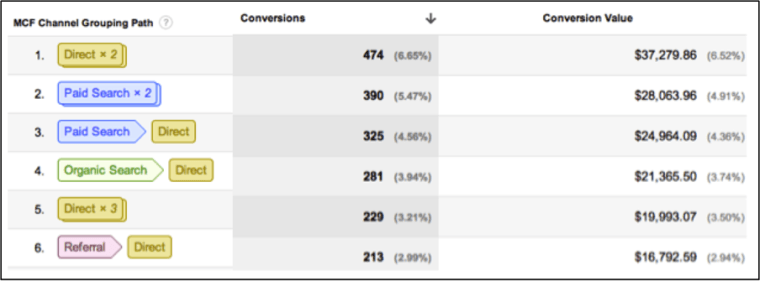There are people in every industry who we look up to, who set the bar for excellence and are pioneers in the field. They are remarkable at their craft, but they also inspire others. Brad Geddes, Melissa Mackey, and David Szetela are just a few of the PPC specialists who have always inspired me to be better.
Great PPC specialists have certain qualities that set them apart. These qualities help with day-to-day management, client relations, and knowledge sharing.
Most importantly, these characteristics foster the ability to think big and answer questions people aren’t even asking.
Below are the five qualities that define the best PPC specialists:
Thinks Critically
What does it really mean to be a critical thinker? Are you critically thinking when you begin preparing for your spring PPC campaigns in the fall? Or are you a critical thinker when you look at a report and anticipate questions your client will ask before he has the chance to ask?
I define questions like these as critically thinking, but only to a certain degree. Bigger, more holistic questions might be:
- What are early trends showing for next spring?
- What cost projections should I be showing the client?
- How have the new Google Shopping campaigns impacted my PLA exposure from previous months?
- How did paid search help other marketing channels?
 A Google Analytics Multi-Channel Funnel report. Screenshot taken 08/22/2014 of Google Analytics
A Google Analytics Multi-Channel Funnel report. Screenshot taken 08/22/2014 of Google AnalyticsA critical thinker looks a step ahead in an effort to get ahead of the game. For example, when Google Shopping first became a fully paid platform, very few people were discussing feed optimization. As Shopping matured, having a well-categorized and clean feed became much more important.
Those who had anticipated the evolution were already practicing advanced tactics.
Critical thinkers look beyond face value. Perhaps a business saw a significant decline in conversions in July 2014 versus July 2013. Eight of the ten campaigns performed the same while two saw conversion decreases. The question then becomes what caused the decrease. At face value, certain keywords performed better last year even though ad copy stayed the same. The conclusion may be that the keywords aren’t as popular, or perhaps they’ve become more expensive.
The critical thinker will look for more in-depth answers. Perhaps the business was the exclusive seller of a product or the price was much lower, causing them to beat the competition. Or external factors like seasonality and popularity allowed the keywords to be more effective in 2013. Or, perhaps a website change has negatively impacted the conversion rate.
Whatever the case may be, a critical thinker researches more deeply.
Thinks Beyond PPC
The best PPC Specialists look at the entirety of the online marketing industry. PPC impacts many channels and vice versa. Here is a perfect example is what is going on with SEO: over the last few years there have been many updates designed to provide users with better organic results. Many companies have lost huge portions of their SEO traffic, forcing a greater investment in PPC.
Additionally, between ad extensions and PLAs, more of the search results page is taken up by paid listings than ever before. This change matters when looking to get the most ROI out of your PPC campaigns.
It’s also about examining how your own site will impact performance and understanding that ongoing site optimizations are important to PPC. Conversion rate optimization (CRO) is the big discussion here. What happens post click should be just as important (if not more so) than getting the click.
Finally, redesigns and everyday website updates must be reviewed. For example, a website’s URL structure can determine how tedious or easy it will be to create remarketing lists.
A great PPC Specialist understands that PPC is part of a much bigger ecosystem.
Writes Well
We often think of PPC as being extremely data oriented, but it is just as much about the written word. Between workload, emails, blogs, and miscellaneous items, I would guess the average PPC professional writes at least a couple thousand words a day. Since writing is such an important part of the job, it makes sense that the best PPC Specialists write well.
The biggest consequence of poor writing is wasted time. Whether it’s an email or a blog, poor writing causes confusion for readers. A client reading an unclear email will respond asking for further clarification, eating up time for both parties. A blog editor is going to spend time editing—or essentially rewriting—the article. The bottom line is that poor writing equals time wasted.
I hit on it earlier, but the biggest thing you can do to avoid wasted time while writing is to anticipate. As you write client emails, foresee what they will ask and answer those questions in the initial email.
For example, if you tell a client that leads are down 30% without explanation, the natural follow-up question will be “Why are my leads down?” Or, if you’re writing a blog, play Devil’s Advocate. Ask yourself why readers may disagree and proactively answer these questions.
You’ll never be able to anticipate every follow-up, but you will save time by answering questions before they are asked.
Loves To Share
The best PPC Specialists enjoy sharing their ideas and findings. Most times, this sharing occurs through blogs, webinars, or conferences. Sharing can also mean engaging in conversations on social media channels such as Twitter and LinkedIn.
 Screenshot taken 08/22/2014 of www.zatomarketing.com
Screenshot taken 08/22/2014 of www.zatomarketing.comThe act of sharing is so important because it showcases the extra, out-of-account time PPC Specialists invest in the industry. Writing a blog post or creating a presentation takes time. Taking up personal time to share knowledge is a selfless act. I’m not saying that these professionals don’t enjoy what they are doing, but it’s still time away from some other part of their lives.
The desire to share leads to my final characteristic of a great PPC professional.
Has the Inherent PPC Passion
It’s easy to tell if someone has a passion for PPC. You can see their excitement when talking about industry updates, and you know they salivate whenever new betas open. Even on their most hectic days they still love talking PPC.
Passion is so important because it shows a willingness to learn and improve. In an ever-changing industry, passion is not just important. It’s a necessity. PPC professionals need to continue to learn and grow.
Conclusion
Think about the top PPC specialists in the industry and consider if they are missing any of these qualities. Great PPC specialists are well-rounded individuals who love what they do and want to better the industry.
So, what qualities do you think are important for PPC specialists to succeed? Feel free to share them in the comments below.
Featured Image: jurgenfr via Shutterstock





![AI Overviews: We Reverse-Engineered Them So You Don't Have To [+ What You Need To Do Next]](https://www.searchenginejournal.com/wp-content/uploads/2025/04/sidebar1x-455.png)